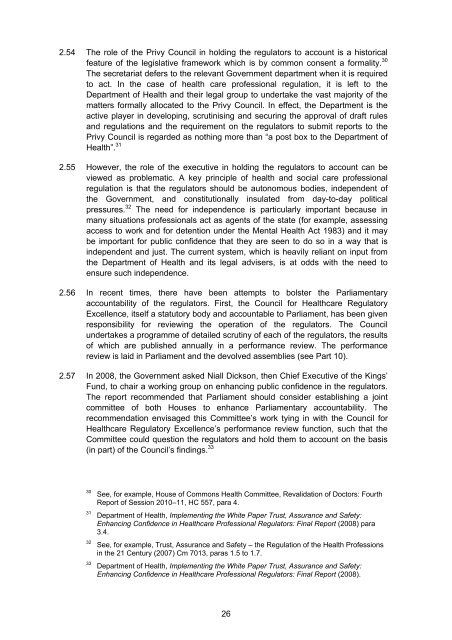Regulation of Health and Social Care Professionals Consultation
Regulation of Health and Social Care Professionals Consultation
Regulation of Health and Social Care Professionals Consultation
You also want an ePaper? Increase the reach of your titles
YUMPU automatically turns print PDFs into web optimized ePapers that Google loves.
2.54 The role <strong>of</strong> the Privy Council in holding the regulators to account is a historical<br />
feature <strong>of</strong> the legislative framework which is by common consent a formality. 30<br />
The secretariat defers to the relevant Government department when it is required<br />
to act. In the case <strong>of</strong> health care pr<strong>of</strong>essional regulation, it is left to the<br />
Department <strong>of</strong> <strong>Health</strong> <strong>and</strong> their legal group to undertake the vast majority <strong>of</strong> the<br />
matters formally allocated to the Privy Council. In effect, the Department is the<br />
active player in developing, scrutinising <strong>and</strong> securing the approval <strong>of</strong> draft rules<br />
<strong>and</strong> regulations <strong>and</strong> the requirement on the regulators to submit reports to the<br />
Privy Council is regarded as nothing more than “a post box to the Department <strong>of</strong><br />
<strong>Health</strong>”. 31<br />
2.55 However, the role <strong>of</strong> the executive in holding the regulators to account can be<br />
viewed as problematic. A key principle <strong>of</strong> health <strong>and</strong> social care pr<strong>of</strong>essional<br />
regulation is that the regulators should be autonomous bodies, independent <strong>of</strong><br />
the Government, <strong>and</strong> constitutionally insulated from day-to-day political<br />
pressures. 32 The need for independence is particularly important because in<br />
many situations pr<strong>of</strong>essionals act as agents <strong>of</strong> the state (for example, assessing<br />
access to work <strong>and</strong> for detention under the Mental <strong>Health</strong> Act 1983) <strong>and</strong> it may<br />
be important for public confidence that they are seen to do so in a way that is<br />
independent <strong>and</strong> just. The current system, which is heavily reliant on input from<br />
the Department <strong>of</strong> <strong>Health</strong> <strong>and</strong> its legal advisers, is at odds with the need to<br />
ensure such independence.<br />
2.56 In recent times, there have been attempts to bolster the Parliamentary<br />
accountability <strong>of</strong> the regulators. First, the Council for <strong>Health</strong>care Regulatory<br />
Excellence, itself a statutory body <strong>and</strong> accountable to Parliament, has been given<br />
responsibility for reviewing the operation <strong>of</strong> the regulators. The Council<br />
undertakes a programme <strong>of</strong> detailed scrutiny <strong>of</strong> each <strong>of</strong> the regulators, the results<br />
<strong>of</strong> which are published annually in a performance review. The performance<br />
review is laid in Parliament <strong>and</strong> the devolved assemblies (see Part 10).<br />
2.57 In 2008, the Government asked Niall Dickson, then Chief Executive <strong>of</strong> the Kings’<br />
Fund, to chair a working group on enhancing public confidence in the regulators.<br />
The report recommended that Parliament should consider establishing a joint<br />
committee <strong>of</strong> both Houses to enhance Parliamentary accountability. The<br />
recommendation envisaged this Committee’s work tying in with the Council for<br />
<strong>Health</strong>care Regulatory Excellence’s performance review function, such that the<br />
Committee could question the regulators <strong>and</strong> hold them to account on the basis<br />
(in part) <strong>of</strong> the Council’s findings. 33<br />
30 See, for example, House <strong>of</strong> Commons <strong>Health</strong> Committee, Revalidation <strong>of</strong> Doctors: Fourth<br />
Report <strong>of</strong> Session 2010–11, HC 557, para 4.<br />
31 Department <strong>of</strong> <strong>Health</strong>, Implementing the White Paper Trust, Assurance <strong>and</strong> Safety:<br />
Enhancing Confidence in <strong>Health</strong>care Pr<strong>of</strong>essional Regulators: Final Report (2008) para<br />
3.4.<br />
32 See, for example, Trust, Assurance <strong>and</strong> Safety – the <strong>Regulation</strong> <strong>of</strong> the <strong>Health</strong> Pr<strong>of</strong>essions<br />
in the 21 Century (2007) Cm 7013, paras 1.5 to 1.7.<br />
33 Department <strong>of</strong> <strong>Health</strong>, Implementing the White Paper Trust, Assurance <strong>and</strong> Safety:<br />
Enhancing Confidence in <strong>Health</strong>care Pr<strong>of</strong>essional Regulators: Final Report (2008).<br />
26
















